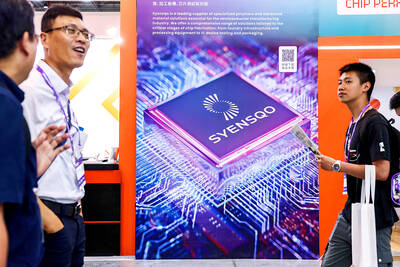The Taipei District Court yesterday rejected Far Eastern Air Transport’s (FAT, 遠東航空) application for corporate restructuring, bringing the heavily indebted airline a step closer to bankruptcy.
The airline filed for reorganization with the Taipei District Court in February, which temporarily exempted it from paying its debts.
However, the court rejected the application yesterday, saying FAT had not disclosed its actual losses in the application and failed to give the court a clear picture of its financial situation.
The court added that the company did not come up with a sound financial restructuring plan detailing how it planned to reduce its operational costs and pay its debts.
FAT could still appeal the case to the Taiwan High Court, the district court said.
After the district court’s rejection of FAT’s application, creditors could take action to protect their own interests by liquidating FAT’s collateral.
FAT’s financial statement as of Sept. 30 showed that it had liabilities of NT$9.99 billion (US$324.8 million), including NT$4.7 billion in bank loans. The company earlier said losses totaled NT$3.4 billion as of Sept. 30.
Meanwhile, FAT workers’ union staged a protest yesterday against the airlines’ failure to pay overdue salaries and called on the government to intervene to help resolve FAT’s financial difficulties.
Mrs Lin, who has worked for five years at FAT, said the company owed each of its 1,200 employees 1.9 months in salary.
This has made life doubly difficult for her and her three children, she said.
“With nearly two-month in unpaid salary, I have lost the strength to continue working,” Lin said.
“I wish the government would reach out and help FAT, or at least let us know whether the company will be able to survive in the near term,” she said.
A pilot, who wished to remain anonymous, resigned yesterday after finding a job with another firm.
“I think it would be hard for the company to get back on its feet. I therefore chose to leave as I have my own career plan,” he said.
The FAT workers’ union also urged the China Aviation Development Foundation (航發會) to directly invest in FAT, or have China Airlines Ltd (CAL, 華航) take an indirect stake in the airline, the union said in a statement.
Civil Aeronautics Administration (CAA) director-general Billy Chang (張國政) said yesterday that the CAA had sent FAT an official notification on Friday asking the airline to improve its operational shortcomings.
“The CAA is entitled to withdraw the company’s freedom of air if it fails to improve,” he said, adding that the deadline is on Monday.
The company still has an opportunity to explain itself, he said.
CAA said that the airline’s shortcomings include its illegal appointment of a general manager, unpaid salaries, disputes surrounding its aircraft leases and insufficient operational funds.
The CAA will fine FAT NT$3 million and former FAT chairman Bai Shu-ping (白旭屏) NT$1 million.
Chang added that the company still owed the CAA approximately NT$160 million.
Chang said the company had refused to turn in its financial statement, which had made it difficult for interested investors to evaluate its potential for purchase.
“Minister [Minister of Transportation and Communications] Mao [Chi-kuo (毛治國)] told us to prepare for the worst scenario,” Chang said.

SEMICONDUCTOR SERVICES: A company executive said that Taiwanese firms must think about how to participate in global supply chains and lift their competitiveness Taiwan Semiconductor Manufacturing Co (TSMC, 台積電) yesterday said it expects to launch its first multifunctional service center in Pingtung County in the middle of 2027, in a bid to foster a resilient high-tech facility construction ecosystem. TSMC broached the idea of creating a center two or three years ago when it started building new manufacturing capacity in the US and Japan, the company said. The center, dubbed an “ecosystem park,” would assist local manufacturing facility construction partners to upgrade their capabilities and secure more deals from other global chipmakers such as Intel Corp, Micron Technology Inc and Infineon Technologies AG, TSMC said. It

People walk past advertising for a Syensqo chip at the Semicon Taiwan exhibition in Taipei yesterday.

NO BREAKTHROUGH? More substantial ‘deliverables,’ such as tariff reductions, would likely be saved for a meeting between Trump and Xi later this year, a trade expert said China launched two probes targeting the US semiconductor sector on Saturday ahead of talks between the two nations in Spain this week on trade, national security and the ownership of social media platform TikTok. China’s Ministry of Commerce announced an anti-dumping investigation into certain analog integrated circuits (ICs) imported from the US. The investigation is to target some commodity interface ICs and gate driver ICs, which are commonly made by US companies such as Texas Instruments Inc and ON Semiconductor Corp. The ministry also announced an anti-discrimination probe into US measures against China’s chip sector. US measures such as export curbs and tariffs

The US on Friday penalized two Chinese firms that acquired US chipmaking equipment for China’s top chipmaker, Semiconductor Manufacturing International Corp (SMIC, 中芯國際), including them among 32 entities that were added to the US Department of Commerce’s restricted trade list, a US government posting showed. Twenty-three of the 32 are in China. GMC Semiconductor Technology (Wuxi) Co (吉姆西半導體科技) and Jicun Semiconductor Technology (Shanghai) Co (吉存半導體科技) were placed on the list, formally known as the Entity List, for acquiring equipment for SMIC Northern Integrated Circuit Manufacturing (Beijing) Corp (中芯北方積體電路) and Semiconductor Manufacturing International (Beijing) Corp (中芯北京), the US Federal Register posting said. The